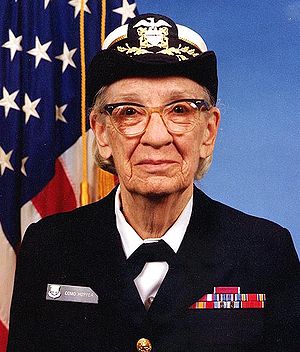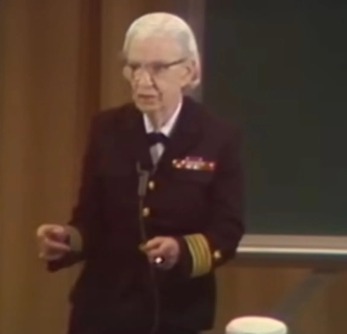| Remembering Grace Hopper On Her 114th Anniversary |
| Written by Sue Gee | |||
| Monday, 09 December 2024 | |||
|
Today sees the start of Computer Science Education Week and the 2024 Hour of Code. These educational event are timed to coincide with Grace Hopper's birthday on January 9th, 1906 due to her concern for teaching computer programming young people. This is an issue touched on in a newly available recording of a lecture she delivered in 1982, worth watching as it will make you laugh out loud.
Grace Brewster Murray Hopper, Grace Hopper gave the lecture titled “Future Possibilities: Data, Hardware, Software, and People,” on August 19, 1982, at which time she held the rank of Captain in the United States Navy Reserve and her job role would these days be termed "Outreach" or "Evangelism". She delivered it at the NSA’s Fort Meade headquarters to an audience of NSA employees. It was then stored in the video archives of the National Cryptographic School. Now that the videos of the lectures are accessible to all, the story of their recovery is itself worth telling. The organization we have to thank is Muckrock, a non-profit that helps individuals and organizations file Freedom of Information Act (FOIA) requests to government agencies. in October 2021 Michael Ravinsky filed a request for a copy of the videos. It took until May 2024 for this to be declined on the grounds of "no responsive documents". Ravinsky countered that they were listed in the NSA's TV Center Catalog and he was then told that the video tapes that might contain the lectures were in a format that NSA no longer had the ability to view or digitize. When this response was publicized it led to Hackaday putting out an appeal for hardware to be made available and to NSA approaching NARA (National Archives and Records Administration) for help and this led to successful retrieval of the footage. Announcing that NSA had finally released the videos, Michael Ravisnky writes: In the lecture, Hopper traces the history and inflection points of the computer industry, predicting it will be the largest industry in America — as well as some of the challenges it is likely to face as it grows up. Yes it does that, but it is also a very amusing treatment of enduring topics including ageism and sexism and is very interesting for highlighting problems that have diminished over time as computers have become cheaper and more powerful - and those that persist, such as data security.
From the very beginning the lecture makes for compulsive viewing - or if you prefer just audio you can find it as a Podcast - see links below. Hopper interweaves the subject matter of her talk with anecdotes about herself which, delivered in her low-key, almost dead-pan style, are invariably amusing and in some instances hilarious. The first topic is data and she refers to her hat badge as providing her identity - as a Navy Captain - and how, when in airports, she is frequently misidentified as an air hostess, and even as a security guard. A quarter of an hour in, Hopper's discussion of the value of data includes her using chalk and the blackboard to present an illustrative graph to reinforce the message about the high cost of incorrect information. She sums up this part of the talk with: "One of the things that bothers me is we talked about data processing for thirty years, we spend all our time talking about the processing hardware and software, we paid no attention to the data. And yet the data is our raw material; our output is information, our product and we should be concentrating on the data in the information. The hardware and software are, after all, only the tools which we do the processing and should not occupy the primary position in our thinking. It's high time, we began to turn our attention to the data and the information that were putting out".
She then digresses to tell the story of the discovery of the famed computer "bug", which having been extracted from the hardware had been preserved for posterity, adding I've told that story a lot of times. It turned out some people didn t believe me, particularly American Federation of information processing societies. So, they made an expedition... and sure enough they found the first bug in the log book under the Scotch tape, so they took a picture of it and last year, in the July 1981 issue of the Annals of the History of Computers they published a picture of the first bug.
She then sashays into a comment on ageism, a recurring theme in the lecture, explaining that in 1946 at the end of the war, she requested to be transferred to the Naval Reserve: and I was turned down because I was too old. The cut-off age was thirty-eight, and I was forty, and incidentally it s just as well to be told your too old when you re forty, because you go through the traumatic experience and it never bothers you again after that. I really recommend it, highly.
As mentioned at the start of this report, Hopper was always an advocate for and a mentor of young people. The topic of the importance to listening to and respecting the skills of young is covered in the second part of the lecture with more amusing anecdotes and personal insights.
Hopper concludes the lecture in a very personal way stating:
I ve received most of the honors that are given to anyone in the computer industry. Each time I received one I thanked them and then I told them something I d like to repeat to you -- I have already received the highest award. I will ever receive no matter how long I live, no matter how many more jobs that I may have. - And that has been the privilege and the responsibility of serving very proudly in the United States Navy.
In fact Grace Hopper continued to be given awards. She was promoted to the rank of Rear Admiral in 1985, which was the year she retired from the Navy as the oldest serving officer in the US Armed Forces and in 2016, as we reported at the time, in 2016, 14 years after her death in 1992, she posthumously received the Presidential Medal of Freedom, the nation’s highest civilian honor, in recognition of her remarkable contributions to the field of computer science. If you want more details of Grace Hopper's achievements see the article Grace Hopper - The Mother of Cobol in our History Section. More InformationAdmiral Grace Hopper’s landmark lecture is found, but the NSA won’t release it Related ArticlesGrace Hopper & Computer Science Education Week The Life and Times Of Admiral Grace Hopper - Infographic Grace Hopper - Building On Her Legacy Grace Hopper - The Mother of Cobol Grace Hopper and the Invention of the Information Age (book review) Google Doodle Celebrates Grace Hopper's Birthday To be informed about new articles on I Programmer, sign up for our weekly newsletter, subscribe to the RSS feed and follow us on Twitter, Facebook or Linkedin.
Comments
or email your comment to: comments@i-programmer.info |
|||
| Last Updated ( Monday, 09 December 2024 ) |



